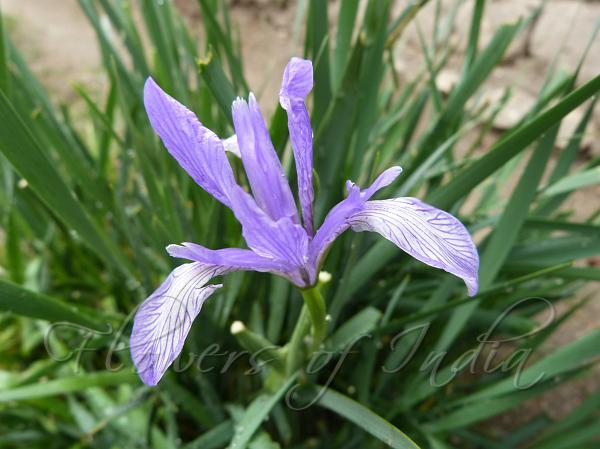|
| Milky Iris |
|

|

| File size | 412267 |
| Original date | 6/25/12 10:04 AM |
| Resolution | 2048 x 1536 |
| Flash | Flash did not fire, auto |
| Focal length | 4.5mm |
| Exposure time | 1/125s |
| Aperture | 3.6 |
| Focus Distance | |
| Metering Mode | Multi-segment |
| Camera make | Panasonic |
| Camera model | DMC-FZ40 |
| Sensor type | OneChipColorArea |
|
|
|
|
Photo: |
Botanical name: Iris lactea Family: Iridaceae (Iris family)
Synonyms: Eremiris lactea
Synonyms: Eremiris lactea
Milky Iris is a beautiful wildflower commonly found
in Kashmir and Ladakh. Rhizomes are sheathed with reddish purple
fibers, creeping, thick. Leaves arise from the base, grayish green,
linear, 14-70 cm long, 3-7 mm wide, tough. Flowering stems are 3-30 cm
long, spathes green, lanceshaped, 4.5-10 x 0.8-1.6 cm, 2--4-flowered,
tip long-pointed. Flowers are pale violet, or partly milky white or
yellow, 5-7.5 cm across. Flower-stalks are 4-7 cm long. Flower-tube is
very short, about 3 mm. Outer segments are oblanceolate, 4.5-6.5 x
0.8-1.2 cm, tip blunt or mucronate. Inner segments are erect, narrowly
oblanceolate, 4.2-4.5 cm x 5-7 mm. Stamens are 2.5-3.2 cm, anthers
yellow. Ovary is narrowly fusiform, very long, 3-4.5 cm, grooved.
Capsule are narrowly cylindric, 6.5-7.5 x 1-1.4 cm, 6-ribbed, tip
shortly beaked. Fruiting stalks are unequal, 4-10 cm. Seeds are
maroon-brown, pyriform. Milky Iris is found in Afghanistan, Kashmir to
Himachal Pradesh, Kazakhstan, Korea, Mongolia, Pakistan, Russia and
China, at altitudes of 1500.
Flowering: April-June.
Medicinal uses:  Roots are reputed to have medicinal properties. Leaves are used as
fodder and for thatching, matting and basket work. Flowers contain
anthocyanin pigment
Roots are reputed to have medicinal properties. Leaves are used as
fodder and for thatching, matting and basket work. Flowers contain
anthocyanin pigment
 Roots are reputed to have medicinal properties. Leaves are used as
fodder and for thatching, matting and basket work. Flowers contain
anthocyanin pigment
Roots are reputed to have medicinal properties. Leaves are used as
fodder and for thatching, matting and basket work. Flowers contain
anthocyanin pigment | Identification credit: Tabish | Photographed in Leh, Ladakh. |